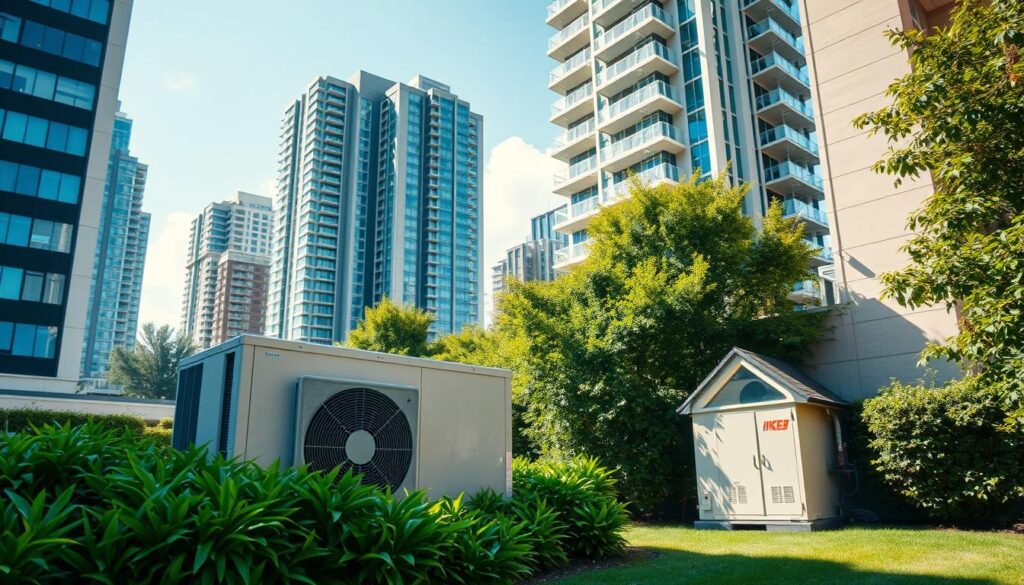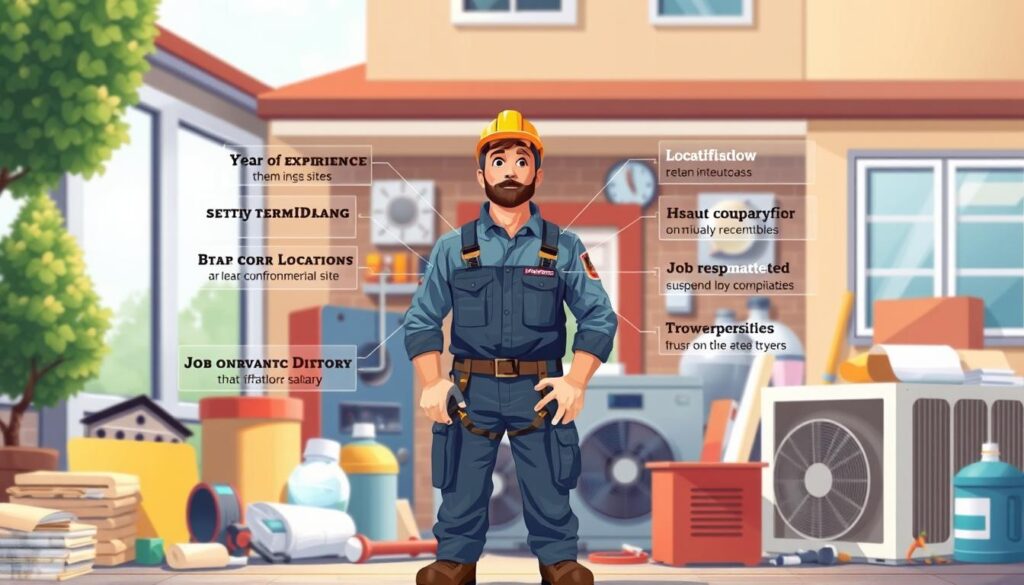Affiliate Disclosure
HVAC Guide Guys is a participant in the Amazon Services LLC Associates Program, an affiliate advertising program designed to provide a means for sites to earn advertising fees by advertising and linking to Amazon.
How Much Money Do HVAC Workers Make? Ever wondered how much HVAC workers earn? They keep our homes cozy, but how much do they make? Let’s uncover the secrets of HVAC technician salaries.

The HVAC field is booming, with good pay to match. Knowing what HVAC workers earn can guide your career choices. It helps set realistic salary goals in this exciting field.
The U.S. Bureau of Labor Statistics says HVAC techs make a median salary that might surprise you. This guide will dive into HVAC technician salary ranges. We’ll look at how experience and location affect earnings.
Key Takeaways
- HVAC technicians enjoy competitive salaries with strong growth opportunities
- Earnings vary a lot based on experience and location
- Certifications can really boost your income
- Starting jobs offer good wages
- Special skills can lead to higher pay in HVAC
Table of Contents
Understanding HVAC Worker Compensation Basics
HVAC workers earn more than just an hourly wage. Your salary depends on your skills, experience, and job duties. Knowing how compensation works can help you plan your career better.
Base Salary Components
The main parts of an HVAC technician’s pay are:
- Hourly base rate ($20-$35 per hour)
- Annual salary range ($46,000-$68,000)
- Specialized skill differentials
- Geographic location adjustments
Common Benefits Packages
Most HVAC jobs come with great benefits. These packages include:
- Health insurance coverage
- Retirement plans (401k)
- Paid vacation and sick leave
- Tool and equipment allowances
- Professional development opportunities
Payment Structures in HVAC Industry
HVAC workers can get paid in different ways:
- Hourly wage: Standard for entry-level positions
- Salary: Fixed annual compensation
- Commission-based: Performance-driven earnings
- Hybrid models: Combination of base pay and bonuses
“Your earning power in HVAC grows with expertise and specialization.” – Industry Professional
National Average HVAC Technician Salary
Exploring hvac career earnings is key for those thinking about this trade. The HVAC industry pays well, showing the value of the skills and knowledge needed.
In 2025, HVAC technicians start at about $54,100 a year. This is a good starting point for those new to the hvac trade wages.
“The HVAC industry provides stable and rewarding career opportunities with competitive compensation,” says industry expert Mark Rodriguez.
Here’s a look at HVAC technician salaries based on experience:
- Entry-level technicians: $40,000 – $48,000 annually
- Mid-level professionals: $50,000 – $62,000 annually
- Experienced technicians: $65,000 – $75,000 annually
Salaries show how much you can earn as you grow in the HVAC field. Your pay can go up a lot as you get more experience and skills.
| Experience Level | Annual Salary Range | Hourly Rate |
|---|---|---|
| Entry-Level | $40,000 – $48,000 | $19 – $23 |
| Mid-Level | $50,000 – $62,000 | $24 – $30 |
| Experienced | $65,000 – $75,000 | $31 – $36 |
Remember, these numbers can change based on where you work, your specialty, and your skills.
Explore Our HVAC Shop
Looking for top-rated HVAC tools, parts, and accessories? Visit our shop and find the perfect solution for your needs.
Visit the ShopExperience Levels and Corresponding Pay Scales
Your pay as an HVAC worker grows with experience. Knowing how your skills lead to better pay helps plan your HVAC career.
Pay for HVAC professionals changes with experience. Each career stage offers chances for financial growth and skill improvement.
Entry-Level Positions (0-2 years)
Starting out, your pay might seem low. New HVAC techs earn about $54,100 a year. You’ll:
- Learn basic technical skills
- Work under more experienced techs
- Gain hands-on knowledge of HVAC systems
Mid-Level Technicians (2-4 years)
With more experience, your pay goes up. Mid-level techs with 2-4 years earn about $65,700 yearly. You’ll:
- Take on more complex installations
- Develop specialized technical skills
- Get more independence in your work
Senior HVAC Professionals (4-7 years)
Experienced techs with 4-7 years earn well. Senior HVAC pros make around $77,200 a year. Your skills will include:
- Advanced system diagnostics
- Leading technical teams
- Expert troubleshooting
Investing in your skills and gaining experience boosts your HVAC career earnings.
How Much Money Do HVAC Workers Make in Different States
How much HVAC workers earn changes a lot from state to state. Your pay can depend on where you live, the local economy, and how much demand there is for skilled workers.
Looking at hvac job salaries, you’ll see big differences. Some places pay more because of things like:
- Cost of living
- Population density
- Industrial infrastructure
- Local climate conditions
Here’s a look at what HVAC workers make in some states:
| State | Average Annual Salary | Ranking |
|---|---|---|
| California | $59,200 | Top Tier |
| New Jersey | $58,300 | High Tier |
| Washington | $58,000 | High Tier |
| Texas | $52,000 | Mid Tier |
| Wyoming | $47,500 | Lower Tier |
“Location can make a significant difference in your HVAC career earnings.” – Industry Salary Expert
Your salary depends on many things. Places with harsh weather or lots of building projects often pay more to HVAC workers.
Pro tip: Research local market conditions and emerging opportunities when considering HVAC job opportunities across different states.
Explore Our HVAC Shop
Looking for top-rated HVAC tools, parts, and accessories? Visit our shop and find the perfect solution for your needs.
Visit the ShopTop-Paying States for HVAC Technicians
Exploring hvac technician salary opportunities reveals some top states for high pay. These states offer HVAC contractors pay rates that are much higher than the national average. This makes them great places for skilled professionals to work.
Knowing about the differences in HVAC pay across states can help you plan your career. Let’s look at the states with the best pay for HVAC technicians.
California: A Lucrative HVAC Market
California is at the top with an average hvac technician salary of $59,200 a year. The state’s strong construction industry, complex climate needs, and high living costs all contribute to these high wages.
- Highest demand in major metropolitan areas
- Extensive commercial and residential HVAC projects
- Advanced technology and green energy initiatives
New Jersey: Competitive HVAC Compensation
New Jersey offers HVAC contractors an average salary of $58,300. The state’s dense population and extreme weather create a steady need for skilled HVAC workers.
| State | Average Salary | Key Factors |
|---|---|---|
| California | $59,200 | High-tech markets, diverse climate needs |
| New Jersey | $58,300 | Dense urban areas, seasonal demands |
| Washington | $58,000 | Tech industry growth, environmental regulations |
Washington: Emerging HVAC Opportunities
Washington comes in third with an average hvac technician salary of $58,000. The state’s growing tech sector and strict environmental rules offer unique chances for HVAC experts.
Pro Tip: While these states have high salaries, think about living costs, job competition, and your career goals before moving.
Commercial vs Residential HVAC Salaries

Looking into hvac installer income shows big differences between commercial and residential HVAC pay. Commercial HVAC workers usually make more because their jobs are more complex and on a larger scale.
There are a few main reasons for these pay differences:
- System Complexity: Commercial HVAC systems are more complex
- Project Scale: Big buildings need bigger installations
- Technical Expertise: Advanced skills mean higher pay
- Certification Requirements: Special skills increase earning power
Commercial HVAC techs work on big projects like office buildings, hospitals, and factories. These jobs need advanced skills and special tools, leading to higher pay.
Residential HVAC workers deal with smaller, simpler systems in homes and apartments. Their work is important, but it doesn’t pay as much as commercial jobs.
Professional tip: Getting advanced training and certifications can really boost your earnings in both commercial and residential HVAC.
Choosing between commercial and residential HVAC can greatly affect your future earnings. Think about your skills, interests, and career goals before making this big decision.
Explore Our HVAC Shop
Looking for top-rated HVAC tools, parts, and accessories? Visit our shop and find the perfect solution for your needs.
Visit the ShopImpact of Certifications on HVAC Income
Understanding your HVAC career earnings means focusing on professional certifications. These can greatly increase your earnings and open up better job opportunities.
Certifications are key to boosting your market value and income. They show your skills, dedication, and ability to work with complex systems.
EPA Certifications: A Critical Credential
The EPA 608 certification is a must for those working with refrigerants. It lets you:
- Work with refrigeration equipment legally
- Show your technical skills
- See a 10-15% increase in your earnings
NATE Certifications: Proving Advanced Expertise
NATE certifications prove your advanced skills. They set you apart in a competitive job market, possibly raising your earnings by showing your expertise.
State-Specific Licenses: Expanding Your Opportunities
Many states need specific HVAC licenses. Getting these can boost your career earnings. It shows you’re professional and can lead to:
- Better-paying jobs
- More complex projects
- More trust from employers and clients
“Certifications are not just pieces of paper—they’re investments in your professional future.” – HVAC Industry Expert
By choosing the right certifications, you can improve your earnings and career in HVAC.
Career Growth and Salary Progression
Your journey in the HVAC industry is full of exciting opportunities. Starting as an entry-level technician, you can move up the ladder. This path leads to higher earnings.
Career progression in HVAC follows a clear path:
- Entry-level technician
- Senior technician
- Team lead
- Supervisor
- Project manager
- Business owner
As you gain experience, your income will grow. Supervisory roles are a big step up, with average earnings of $90,800. Special skills and certifications can speed up your climb.
| Career Stage | Avg. Annual Earnings | Key Responsibilities |
|---|---|---|
| Entry-Level | $35,000 – $45,000 | Basic installations, repairs |
| Senior Technician | $50,000 – $65,000 | Complex system maintenance |
| Supervisor | $80,000 – $95,000 | Team management, project oversight |
Entrepreneurial HVAC pros can start their own businesses. This can lead to even higher earnings by growing your client base. Planning your career and keeping your skills sharp are essential for success in this field.
Explore Our HVAC Shop
Looking for top-rated HVAC tools, parts, and accessories? Visit our shop and find the perfect solution for your needs.
Visit the ShopFactors Affecting HVAC Worker Compensation
Figuring out how much HVAC workers earn involves looking at several key factors. It’s not just about their skills or years of experience. Many other elements also play a big part in their salaries.

There are many things that can change how much you can earn in the HVAC field. Let’s look at the main factors that affect how much you can make:
Geographic Location Impact
The place where you work greatly affects your earnings. Cities usually pay more than rural areas because of:
- Higher cost of living
- Greater demand for HVAC services
- More complex infrastructure needs
Market Demand Dynamics
HVAC salaries change with market demand. When there’s a lot of demand, like in summer or winter, you can earn more. This is because there are more jobs available.
Economic Conditions
The overall economy also affects HVAC worker pay. When the economy is growing, there are more construction projects. This means more jobs and possibly higher pay. But when the economy is down, there might be fewer jobs and lower pay.
Professional HVAC technicians who keep up with market changes and improve their skills can keep their salaries competitive, even when the economy is tough.
Overtime and Bonus Opportunities
HVAC technicians can earn more by working overtime and getting bonuses. These extra ways to make money can really add up. They give a big financial boost on top of their regular pay.
Overtime is a big part of an HVAC tech’s earnings. In busy seasons like summer and winter, there’s a lot of demand. This means more hours of work. Technicians usually get paid 1.5 to 2 times their regular hourly rate for overtime.
- Emergency service calls often get higher rates
- Seasonal peaks mean more overtime chances
- Working weekends and nights can increase pay a lot
Bonuses based on performance are another way to make more money. Many HVAC companies give bonuses for:
- High customer satisfaction ratings
- Successful equipment installations
- Selling extra services or maintenance plans
Smart HVAC pros use these chances to make more money. They turn a regular job into a profitable career.
Strategic technicians can boost their yearly earnings by 15-25% with overtime and bonuses.
Market Outlook and Future Salary Trends
The HVAC industry is set for exciting growth. It’s expected to grow by 5% through 2030. This means good news for those wanting a stable and well-paying career in the trade.
New technologies are changing hvac trade wages and what skills are needed. Smart HVAC systems and using renewable energy are opening up new ways for technicians to earn more. Those who keep up with these changes can see big financial gains.
- Smart home technology integration
- Energy-efficient system design
- Advanced diagnostic technologies
- Sustainable heating and cooling solutions
Environmental rules are making HVAC jobs more in demand. Green technology and saving energy are key. Your knowledge of new systems could lead to higher pay and job security.
Experts say HVAC techs with advanced skills and certifications will earn more. Being able to work with complex, energy-saving systems will make you stand out.
“The future of HVAC is not just about fixing systems, but about designing intelligent, sustainable solutions.” – Industry Expert
Your career in HVAC looks promising. By keeping up with new tech and improving your skills, you can see big financial gains in this exciting field.
Conclusion
Learning about HVAC worker salaries shows a promising career with good money-making chances. Technicians can earn between $46,000 and $68,000 a year. This depends on their experience, where they work, and their special skills.
As you get better at your job and get more certifications, your salary can go up. The HVAC field has many ways to make more money. Getting professional training, getting certified by NATE, and working in areas that need more people can help a lot.
Where you live also affects how much you can earn. Places like California, New Jersey, and Washington pay more. This is because they need more HVAC workers.
To do well in HVAC, you must keep learning and updating your skills. As technology changes and saving energy becomes more important, skilled workers are in high demand. If you’re willing to improve your skills, you’ll find many chances in both homes and businesses.
Knowing how much you can earn and planning your career can lead to success. The HVAC industry offers not just a job but a chance to grow financially and find job satisfaction.

